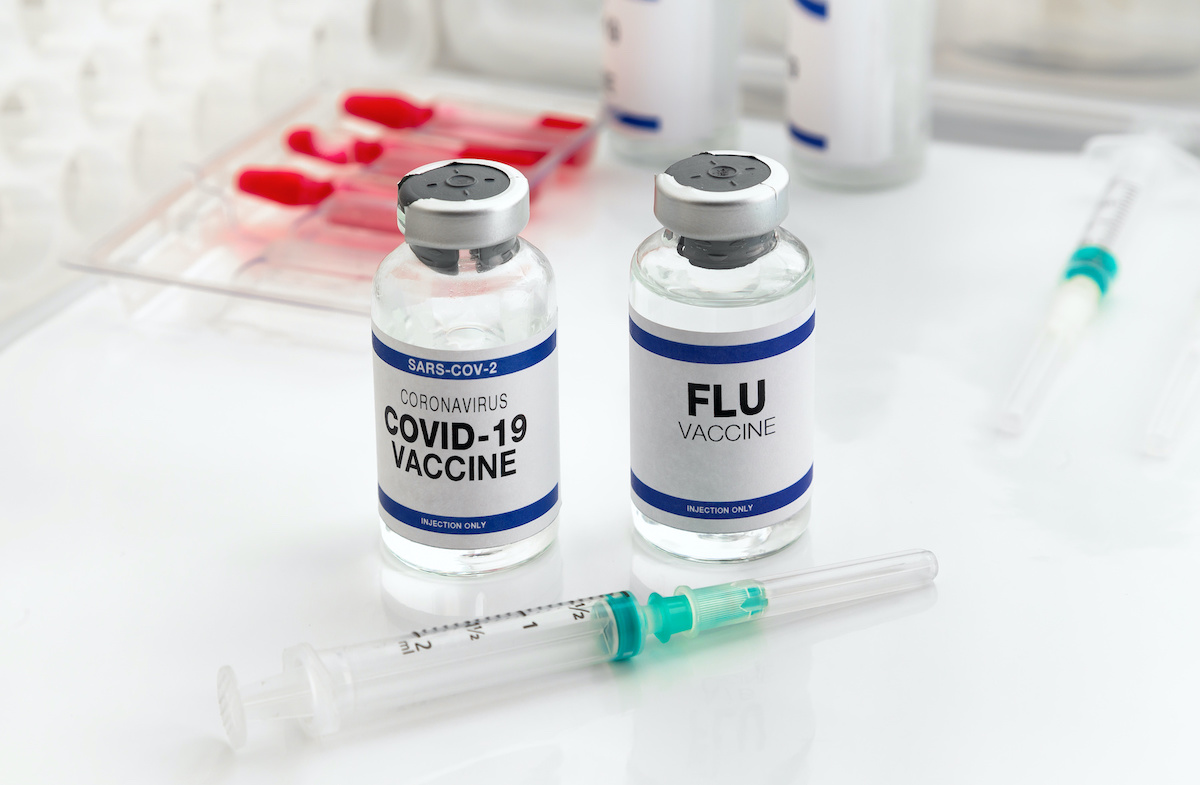By DeeDee Stiepan

Influenza (flu) and COVID-19 are both highly contagious respiratory illnesses. COVID-19 is caused by infection with a coronavirus (SARS-CoV-2), and flu is caused by infection with an influenza virus. The best way to protect yourself from either of these illnesses is to get vaccinated. Updated vaccines for both influenza and COVID-19 are now available.
What is expected from the 2024-25 influenza season? Dr. Robert Jacobson, medical director for Mayo Clinic’s Primary Care Immunization Program says, “You can expect this upcoming flu season to be ‘more typical’ than what everyone saw in the early days of the COVID-19 pandemic”.
“That means all of us need to get our flu vaccines—even babies born now, when they turn 6 months, are going to need that protection because the season starts in fall and goes through winter, often peaking somewhere between December and March,” says Dr. Jacobson.
When is the best time of year to get a flu shot? Dr. Jacobson recommends everyone 6 months and older get vaccinated for the flu as soon as possible.
“It takes two to four weeks for the vaccine to work, and you want to get the vaccine before you start seeing the virus. It does no good once you’ve been exposed,” he says.
For most people, the ideal time to get vaccinated is by the end of October, before the number of flu cases becomes significant.
Guidelines for certain populations:
- Those 65 years and older should take advantage of one of three vaccines especially designed for their age group that can help protect them from the flu and help them avoid hospitalization. Older adults should not get their flu shots in July or August.
- Pregnant women in their third trimester should be vaccinated for the flu as early as possible, so the immunity can be passed on to their babies through the placenta and provide protection for the first six months of their lives.
- Children 6 months and older who are getting the flu shot for the first time will need two infant doses of the vaccine, 28 days apart.
New this year are recommendations for those 18 and older who recently had a solid organ transplant and are on immunocompromising medicine to receive the more potent vaccination, designed for those 65 and older.
What are some medical reasons why someone may refrain from getting a flu shot? “There’s really only one major one, and that is if you’ve had a serious allergic reaction, that is anaphylaxis, and not just hives. If you have had anaphylaxis to a previous flu vaccine or to one of the components in the flu vaccine (other than eggs), you should not get that vaccine again.”
Can someone get a flu shot if they are allergic to eggs? “If you have egg allergy, even a serious egg allergy, you can get the flu vaccine, even if that flu vaccine was made in part with hen’s eggs,” says Dr. Jacobson.
What about those who have had Guillain-Barre syndrome? “You should have a discussion with your clinician if you’ve had Guillain-Barre syndrome, or GBS, within six weeks of a previous flu vaccine,” says Dr. Jacobson.
Injected form vs. FluMist: The injected form of the flu vaccine is inactive. However, there is a live, attenuated vaccine known as FluMist, which is a nasal spray.
For certain populations, Dr. Jacobson says they should get the inactivated influenza vaccine and not the FluMist. Those include:
- Those who are pregnant.
- Those with chronic diseases that put them at higher risk for getting the flu.
- Those who are immunocompromised.
At-home nasal spray vaccine option. The Food and Drug Administration approved the first at-home nasal spray flu vaccine that does not need to be administered by a health care professional.
Dr. Jacobson says the at-home FluMist nasal spray flu vaccine is just as safe and effective as those administered in a doctor’s office or pharmacy. He adds, “It could be an option for healthy individuals between 2 and 49 years old. And it’s an incredibly safe vaccine to be mailed and received at home.”.
Who should not receive the at-home nasal spray vaccine option? Because it’s a live virus and hasn’t been studied enough for use in certain populations, he says those who are immunocompromised, pregnant or have a chronic condition should not use the nasal spray.
Will there be a rise in COVID-19 infections this fall/winter? While COVID-19 isn’t seasonal in the same way influenza is, cases are expected to increase during the winter months as more people congregate indoors.
“This updated COVID-19 vaccine is designed for the circulating strains of COVID-19. It’s been shown to be safe, effective and, based on what’s circulating, needed and without good alternatives,” he says.
If someone received the COVID-19 vaccine this summer, do they still need one this fall? “This is a different vaccine, and most healthcare facilities actually purposely stopped vaccinating at the end of July, knowing that this new vaccine was coming out. Those who somehow got the vaccine in August need to wait eight weeks before they get this new vaccine, so their body really sees it and responds to it,” says Dr. Jacobson.
Is it safe to get the flu and COVID-19 vaccinations at the same time? YES, it is it safe, and also safe to get with other vaccines. Dr. Jacobson recommends getting your flu and COVID-19 vaccinations in the same visit. He says, other than the possibility of sore arms, there are no disadvantages.
What do you say to those on the fence about getting updated COVID-19 and influenza vaccinations? “It’s a powerful tool to allow your body to make good immunity to the disease without you having to get the disease,” says Dr. Jacobson.
“And it’s a broader immunity. You get a bout of the flu, you’re only immune to that strain. When you get the flu vaccine, you’re immune to three to four strains, and you weren’t contagious. You get the vaccine, you are immune. You’re stopping it from spreading in your household and your work and your play community, and you didn’t get anyone else sick either.”
Source: Excerpted and adapted from the article at https://newsnetwork.mayoclinic.org/ discussion/video-mayo-clinic-expert-answers-common-questions-about-the-flu-covid-19/; October 16, 2024.











